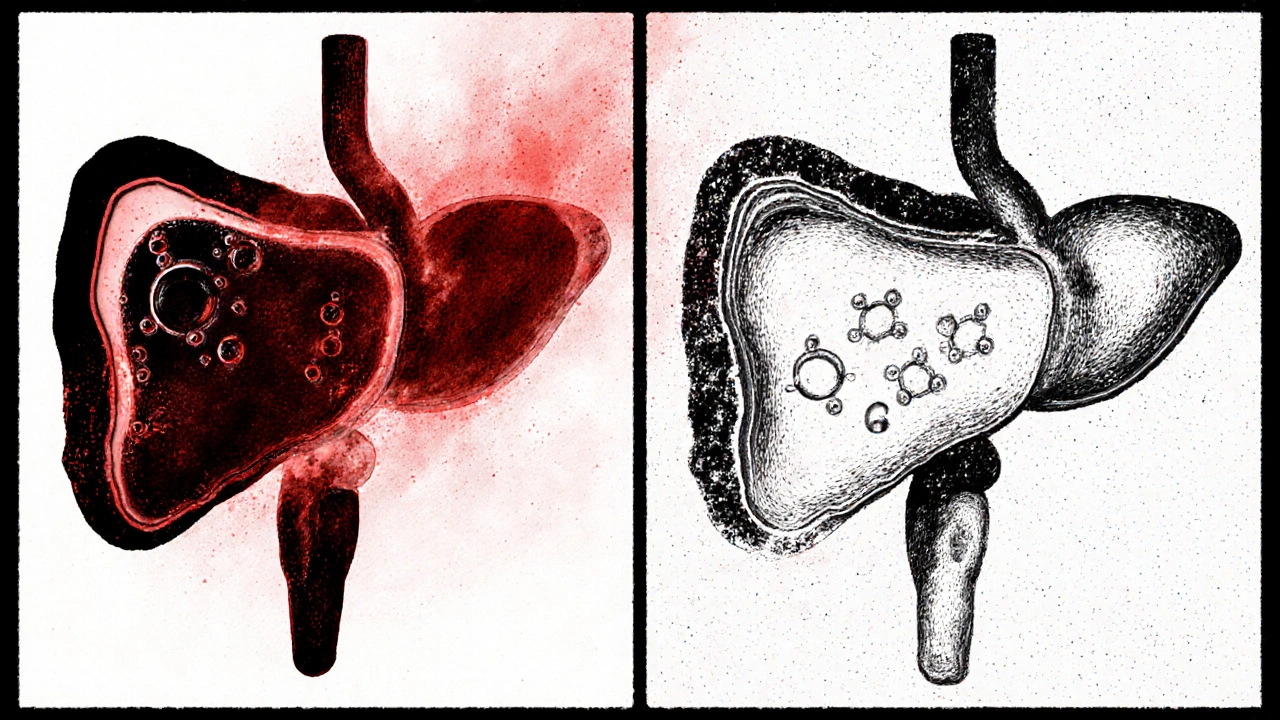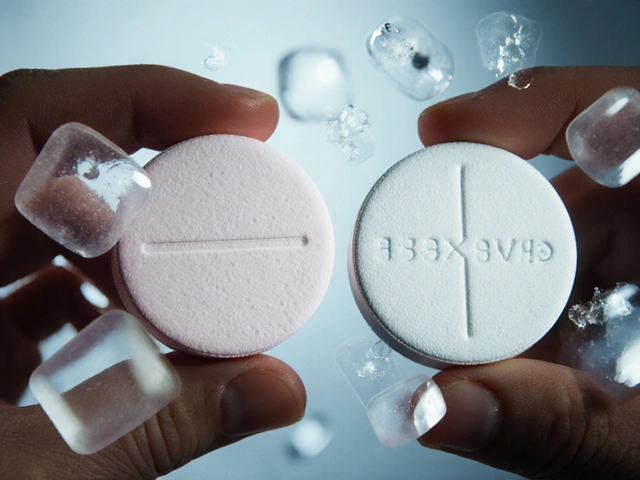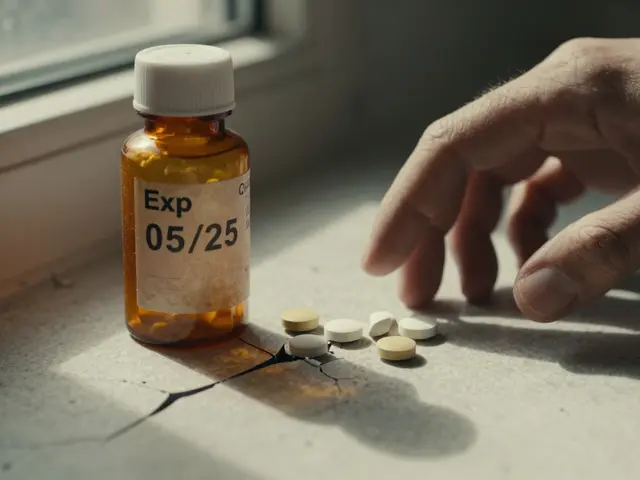Every year, millions of people take aspirin for headaches, fever, or heart protection. But what if it could also help your gallbladder? It’s not just about pain relief-research suggests aspirin might play a quiet but important role in keeping your gallbladder healthy. This isn’t guesswork. Studies dating back over two decades have linked regular low-dose aspirin use to lower rates of gallstones and reduced gallbladder inflammation. If you’ve ever dealt with gallbladder pain, you know how sudden and severe it can be. What if something as simple as a daily aspirin could reduce that risk?
How aspirin affects gallbladder function
The gallbladder stores bile, a fluid made by the liver to help digest fats. When it works right, bile flows smoothly into the small intestine. But when bile becomes too concentrated, it can harden into stones-mainly made of cholesterol. Aspirin doesn’t dissolve existing stones. Instead, it helps stop them from forming in the first place.
Here’s how: aspirin lowers the production of a protein called PCSK9, which controls how much cholesterol your liver releases into bile. Less cholesterol in bile means less chance of it crystallizing into stones. A 2019 study published in Gastroenterology followed over 80,000 women for 20 years. Those who took aspirin at least twice a week had a 22% lower risk of developing gallstones compared to those who didn’t. The effect was strongest in people who took it regularly, not just occasionally.
Aspirin also reduces inflammation. Chronic low-grade inflammation in the gallbladder wall can slow down how well it contracts and empties. When the gallbladder doesn’t empty properly, bile sits too long and thickens. Aspirin’s anti-inflammatory action helps the muscle stay responsive, keeping bile moving.
Aspirin vs. other pain relievers
Not all painkillers work the same way for gallbladder health. Acetaminophen (Tylenol) reduces pain and fever but doesn’t touch inflammation or cholesterol levels. Ibuprofen (Advil) is anti-inflammatory, but studies haven’t shown it lowers gallstone risk the way aspirin does.
Why the difference? Aspirin uniquely blocks an enzyme called COX-1, which is involved in both inflammation and cholesterol metabolism. Other NSAIDs mostly target COX-2, which has less impact on the liver’s cholesterol pathways. That’s why aspirin stands out. A 2021 analysis in the Journal of Hepatology reviewed 12 studies involving nearly 300,000 people. Only aspirin consistently showed a protective effect against gallstones across all groups.
Who benefits most from aspirin for gallbladder health
Not everyone needs to start taking aspirin just for their gallbladder. The strongest evidence points to people at higher risk:
- Women over 40-gallstones are twice as common in women, especially after menopause
- People with obesity or rapid weight loss-both increase cholesterol in bile
- Those with a family history of gallstones
- People with type 2 diabetes-higher insulin levels boost liver cholesterol production
- Individuals on long-term estrogen therapy-like birth control or hormone replacement
For these groups, low-dose aspirin (81 mg daily) may offer protection without major side effects. But it’s not a one-size-fits-all solution. If you have a history of stomach ulcers, bleeding disorders, or are over 70, the risks may outweigh the benefits. Always talk to your doctor before starting.

The risks of daily aspirin
Aspirin isn’t harmless. Even at low doses, it can irritate the stomach lining, cause internal bleeding, or interact with blood thinners. People with asthma triggered by NSAIDs should avoid it entirely. In rare cases, aspirin can lead to Reye’s syndrome in children or teens recovering from viral infections.
One 2023 study in The BMJ found that for healthy adults under 60 with no heart disease, the risk of gastrointestinal bleeding from daily aspirin was higher than the benefit of preventing a first heart attack. That’s why guidelines from the American Heart Association no longer recommend aspirin for primary prevention in low-risk people.
So if you’re thinking about aspirin for your gallbladder, you’re not just weighing gallstone risk-you’re weighing bleeding risk too. The numbers matter: for every 1,000 people taking low-dose aspirin daily for 10 years, about 3 to 5 will avoid a gallstone, but 1 to 2 will have a serious bleed. That’s why it’s not a supplement. It’s a medical decision.
What else supports gallbladder health
Aspirin might help, but it’s not a magic bullet. Lifestyle plays a bigger role. Eating more fiber-especially from vegetables, beans, and whole grains-helps your body clear cholesterol faster. A 2020 study showed people who ate 30 grams of fiber daily had 35% fewer gallstones than those who ate less than 15 grams.
Regular movement matters too. Sitting all day slows bile flow. Just 30 minutes of brisk walking five times a week reduces gallstone risk by nearly 20%. Avoiding crash diets is critical. Losing more than 3 pounds a week spikes cholesterol in bile and triggers stone formation.
Hydration helps. Dehydration makes bile thicker. Drinking enough water-about half your body weight in ounces-is a simple habit that keeps bile fluid. Caffeinated coffee, surprisingly, has also been linked to lower gallstone rates. One cup a day may reduce risk by 10%, likely due to compounds that stimulate gallbladder contractions.

When to see a doctor
Most gallstones never cause symptoms. But if you start having pain in your upper right abdomen-especially after eating fatty meals-it could be something serious. Other signs include nausea, vomiting, fever, or yellowing skin and eyes. These aren’t just discomforts-they’re red flags for infection or blocked ducts.
Don’t wait. If you suspect gallbladder trouble, get checked. Ultrasounds can spot stones in minutes. Blood tests can reveal inflammation or liver stress. If you’re already taking aspirin and notice dark stools, vomiting blood, or unusual bruising, stop immediately and call your doctor. These could be signs of internal bleeding.
There’s no need to panic over occasional discomfort. But ignoring persistent symptoms can lead to emergency surgery. The goal isn’t to self-treat with aspirin. It’s to understand your risk and work with your doctor to manage it.
Final thoughts
Aspirin isn’t a cure for gallbladder disease. But for some people, it’s a tool that might reduce risk. The science is clear: regular low-dose aspirin is linked to fewer gallstones and better gallbladder function. That doesn’t mean everyone should take it. It means if you’re already on aspirin for heart health-or if you’re at high risk for gallstones-there’s an added benefit you might not have known about.
The real takeaway? Prevention is simpler than you think. Eat fiber. Move daily. Stay hydrated. And if you’re considering aspirin, don’t start on your own. Talk to your doctor. They can weigh your personal risks and help you decide if the potential benefit is worth it.
Can aspirin dissolve gallstones?
No, aspirin cannot dissolve existing gallstones. It only helps reduce the chance of new stones forming by lowering cholesterol levels in bile and reducing inflammation. Treatments that dissolve stones, like ursodeoxycholic acid, work differently and are only used in specific cases under medical supervision.
Is it safe to take aspirin daily for gallbladder health?
For most healthy adults under 60 without bleeding risks, low-dose aspirin (81 mg) is generally safe. But daily use increases the risk of stomach bleeding and ulcers. It should never be started without consulting a doctor, especially if you have a history of gastrointestinal issues, are on blood thinners, or are over 70.
Does aspirin help with gallbladder pain?
Aspirin may help reduce mild inflammation-related discomfort, but it’s not a reliable pain reliever for acute gallbladder attacks. If you’re having severe pain, fever, or vomiting, it could mean a blocked duct or infection-this requires immediate medical attention, not just painkillers.
Can I take aspirin instead of surgery for gallstones?
No. Aspirin cannot replace surgery for symptomatic or complicated gallstones. If stones are blocking ducts, causing infection, or damaging the gallbladder, cholecystectomy (gallbladder removal) is the standard treatment. Aspirin is only a preventive measure for people at risk, not a treatment for active disease.
How long does it take for aspirin to affect gallbladder health?
Studies show the protective effect builds over years, not weeks. People who took aspirin regularly for 5-10 years had the lowest risk of gallstones. It’s a long-term preventive strategy, not a quick fix. Don’t expect immediate results.
Are there natural alternatives to aspirin for gallbladder health?
Yes. A high-fiber diet, regular physical activity, staying hydrated, and moderate coffee intake have all been linked to lower gallstone risk. These are safer, evidence-backed options for most people. Unlike aspirin, they don’t carry bleeding risks and offer broader health benefits.
If you’re at risk for gallstones, focus on what you can control: your diet, your movement, and your doctor’s advice. Aspirin might be part of the picture-but only if the numbers add up for you.




Matthew Wilson Thorne
October 28, 2025 AT 23:53Aspirin for gallstones? Cute. I’ve been taking low-dose since ‘18-no stones, no drama. But honestly, if you’re not eating fiber and moving, you’re just delaying the inevitable.
April Liu
October 29, 2025 AT 07:41This is such a helpful breakdown! 🙌 I had gallbladder issues last year and my doctor actually mentioned aspirin as a possible preventive-never thought it could help like this. So glad you clarified it’s not a cure, just a shield. Also, fiber + walking? My new mantra. Thanks for making this feel doable!
Emily Gibson
October 30, 2025 AT 18:55I love how you laid this out. So many people think pills are magic, but it’s the small daily habits that really add up. Fiber, water, movement-these are the real heroes. Aspirin? Maybe a sidekick. But never the main character. 💪
Mirian Ramirez
October 31, 2025 AT 11:02Okay so I just read this whole thing and I’m like wow I never knew aspirin could do this for the gallbladder but like I’m kinda scared now because I’ve been taking it for my headaches and I’m 43 and female and my mom had gallstones so I’m like maybe I should talk to my doc but also I’m scared of bleeding and I think I might have a tiny ulcer from last year but I’m not sure so maybe I should just eat more broccoli and walk more??
Kika Armata
October 31, 2025 AT 19:58How quaint. You’re treating aspirin like some sort of folk remedy, as if the 2019 Gastroenterology study didn’t control for confounders like BMI, estrogen use, and dietary fiber intake-which, by the way, are the *real* variables here. The data is suggestive, not causal. And coffee? Please. That’s just observational noise. If you’re not citing Mendelian randomization studies, you’re not doing science-you’re doing wellness blog content.
Herbert Lui
November 1, 2025 AT 01:10There’s something poetic about aspirin-this little white pill, quiet as dawn, working in the shadows of your liver, whispering to cholesterol not to crystallize. We reach for it for headaches, but it’s been holding space for your gallbladder all along. No fanfare. No ads. Just biochemistry, doing its slow, silent dance. Maybe healing isn’t always loud. Maybe it’s just… consistent.
Nick Zararis
November 2, 2025 AT 21:10Important note: Aspirin doesn’t dissolve stones-repeat: doesn’t dissolve stones. Aspirin reduces formation-yes. Aspirin reduces inflammation-yes. Aspirin is not a substitute for surgery-ABSOLUTELY NOT. And if you’re over 70, or have a history of ulcers, or are on warfarin-STOP. Just stop. Talk to your doctor. Please. Seriously. I’m not joking.
April Liu
November 4, 2025 AT 20:21You said fiber and walking are the real heroes… but what about turmeric? Or apple cider vinegar? People swear by it. And why are we ignoring the gut microbiome angle? You’re oversimplifying. It’s not just broccoli-it’s epigenetics, it’s bile acid signaling, it’s the whole damn system. You’re treating this like a nutrition pamphlet, not a biological cascade.